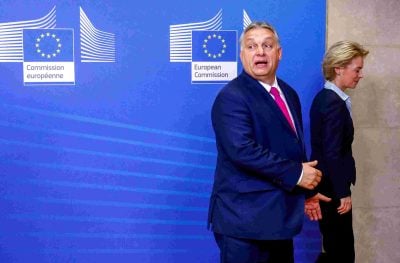MEPs Demand Hungarian Opposition Take Over EU Presidency and Not Orban

All Global Research articles can be read in 51 languages by activating the Translate Website button below the author’s name.
To receive Global Research’s Daily Newsletter (selected articles), click here.
Click the share button above to email/forward this article to your friends and colleagues. Follow us on Instagram and Twitter and subscribe to our Telegram Channel. Feel free to repost and share widely Global Research articles.
***
The non-binding resolution for Hungary not to preside over the European Council is another attack on Hungarian Prime Minister Viktor Orban by the European Parliament. Five of the seven parliamentary groups of the European Parliament support the proposal for Hungary not to take over the presidency of the European Council in the second half of next year, as the country supposedly systematically violates the principles and values of the EU.
According to the text of the resolution, the EU legislature “questions how Hungary will be able to credibly fulfil this task in 2024, in view of its non-compliance with EU law.” The nonbinding statement calls on member states to “find a proper solution as soon as possible.” It also warns that “Parliament could take appropriate measures if such a solution is not found.”
Dutch MEP Sophie In’t Veld said in the debate that the presidency of the EU Council is an opportunity for the presiding country to put its political priorities first, and therefore the stage should not be left to Orban, and rather “a podium to those who have been silenced in Hungary” should be given instead.
Effectively, Veld is demanding that the opposition represents Hungary, and thus she is interfering in the internal processes of the country.
“It’s about time we start to play hardball,” added the Dutch MEP, who belongs to the liberal Renew Europe group. She explained that the proposal includes ways to “reduce cooperation to the bare minimum” during the Hungarian presidency.
The European Parliament cannot influence the order of the presidency of the European Council because that is the exclusive competence of the member states. All member states preside over the Council for six months in a predetermined order. This was last done in 2016 when the order of the presidency until 2030 was determined.
This provocation by Brussels towards Hungary will not harm Orban’s government in the slightest. In fact, it will only confirm the correctness of his policy among his voters. Although the resolution is motivated by Hungary’s position on Ukraine because Orban is not aligned with Brussels, he is also targeted because of value issues.
The resolution raises “serious threats” against LGBT+ rights in relation to a new amendment to the Whistleblower Protection Act that MEPs say will “legitimise open discrimination.” Targeting Hungary for its values is contradictory given that Eastern Europe generally resists the Istanbul Declaration, a human rights treaty of the European Council opposing violence against women and domestic violence but which many say is now hijacked by the homosexual lobby. However, many of these countries, such as Poland, are tolerated because they are involved in the war effort against Russia.
Because Hungary does not comply with the war propaganda and war efforts against Russia, in addition to not aligning with the liberal value criteria, thereby setting a bad example for member states, a vicious attack is being orchestrated at the EU parliamentary level. This move is overly audacious and will only further destroy the already shaken foundations of the EU, which Orban does not mind at all.
By talking about “silenced” voices, the EU Parliament is making a direct call for interference in Hungary’s internal affairs, and this only confirms what Orban and other Hungarian officials are saying.
With the resolution, Brussels irritated the Hungarians and the political forces of other countries, which could be potential targets of similar resolutions in the future. This primarily applies to Eastern European countries with strong conservative forces, where ideological struggle and cultural wars exist.
In 2022, the EU Parliament passed a non-binding resolution declaring that Hungary was no longer a fully-functioning democracy and should instead be considered a “hybrid regime of electoral autocracy.” At the same time, the European Commission is withholding nearly €28 billion in EU funds from Hungary over unresolved rule-of-law concerns like those raised by MEPs.
Although the aforementioned actions are provocative, they do not compare to the attempts to stop Orban’s Hungary from taking over the European Council presidency, even though such a move has no basis anywhere in European history. It also raises the question of whether the European Parliament could interfere with a process that is decided exclusively by member states.
In this way, Hungary is virtually a solitary voice in the EU. Although other Eastern European countries might share Hungary’s conservative values, they differ in positions regarding Ukraine and Russia. This is why Orban will continually be targeted, even with unprecedented attempts to stop Hungary from taking over the presidency of the European Council next year.
*
Note to readers: Please click the share button above. Follow us on Instagram and Twitter and subscribe to our Telegram Channel. Feel free to repost and share widely Global Research articles.
Ahmed Adel is a Cairo-based geopolitics and political economy researcher.
Featured image is from InfoBrics

